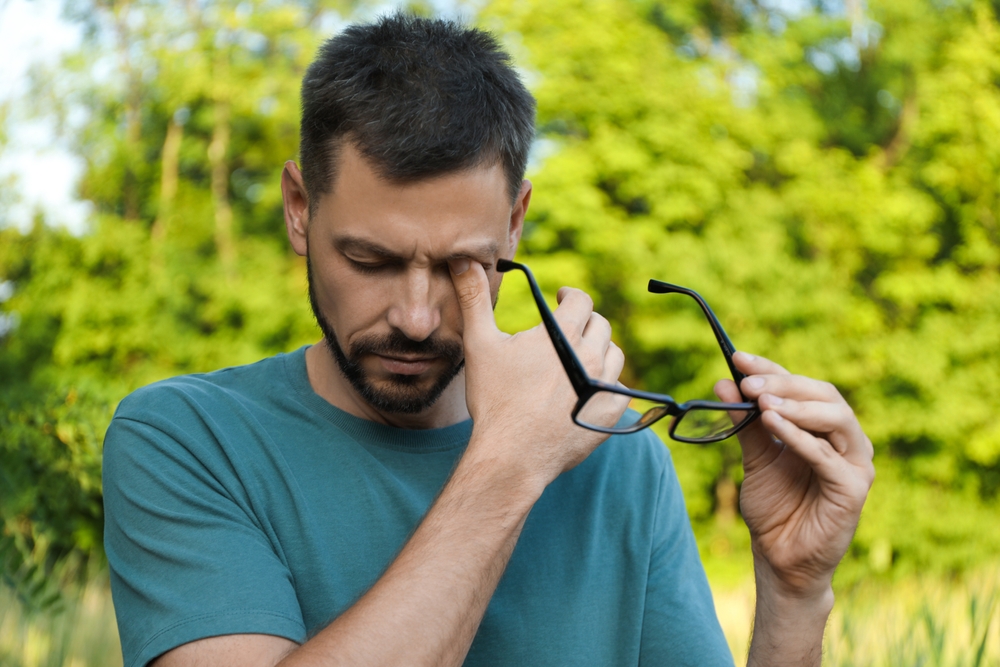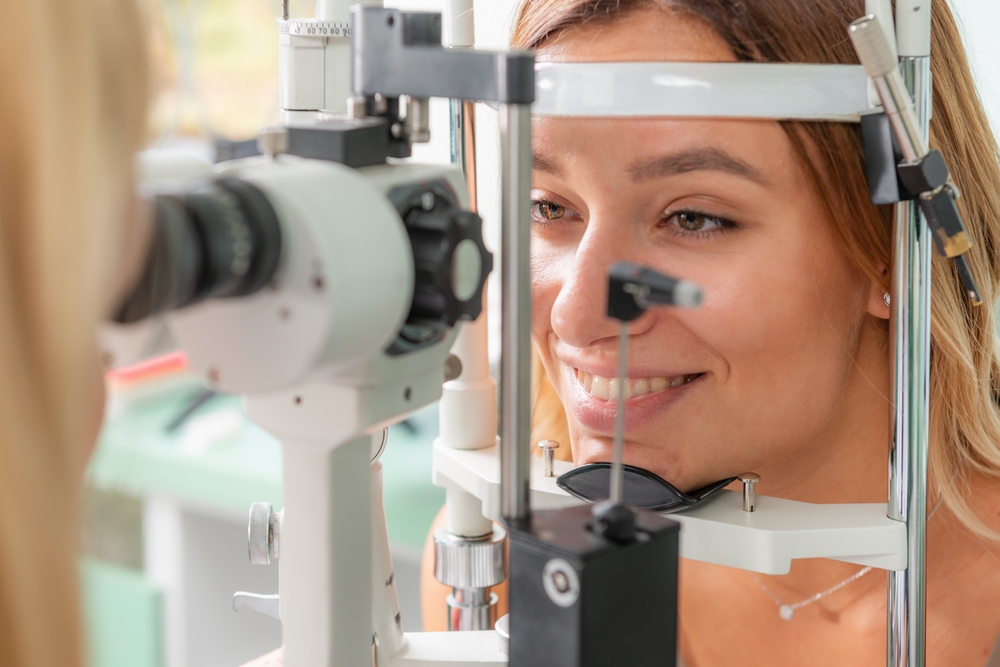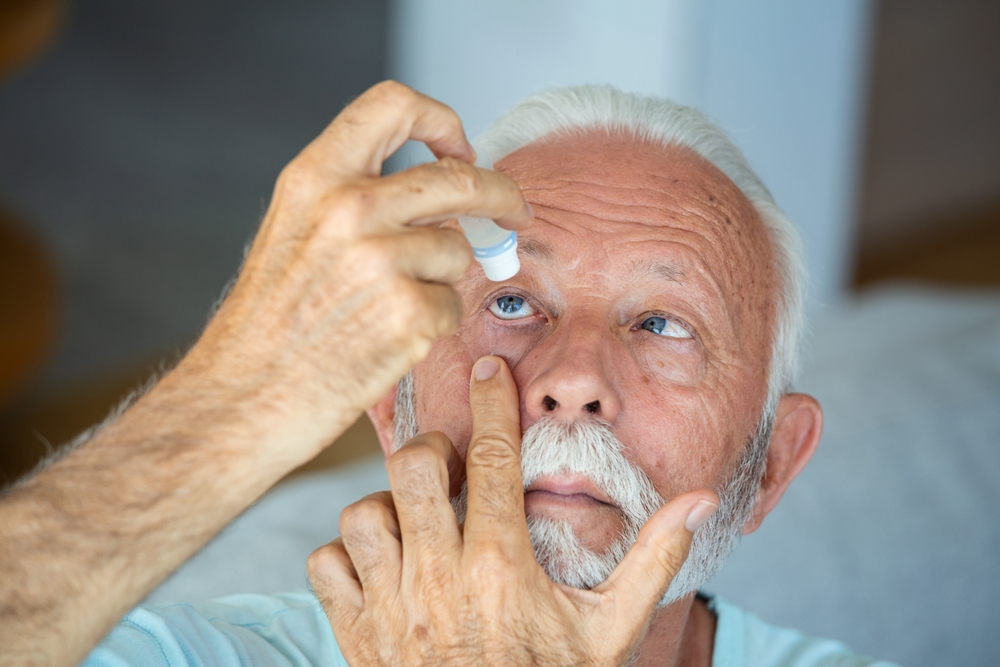Dry eye syndrome is a common condition that affects millions of people worldwide. It can occur when the eyes don’t produce enough tears or when the tears evaporate too quickly, leading to discomfort, irritation, and even vision problems.
Although dry eye syndrome can be detected during a comprehensive eye examination, sometimes additional testing is needed to figure out the exact cause. A dry eye evaluation can help determine the specifics of your dry eye disease.
What is Dry Eye Syndrome?
Dry eye syndrome is an eye condition characterized by insufficient tear production or poor tear quality. Tears are essential for maintaining the health and comfort of the eyes, as they lubricate the surface of the eye, wash away debris, and provide nutrients to the cornea.

When the eyes don’t produce enough tears or the tears evaporate too quickly, it can lead to a range of symptoms, including:
- Dryness
- Irritation
- Burning or stinging sensation
- Grittiness or the feeling of something in the eye
- Blurred vision
- Light sensitivity
- Eye fatigue
- Excess watering
Not everyone will experience the same symptoms of dry eye. However, if you notice any of the above symptoms, it is important to visit your eye doctor for an eye exam.
Can Eye Doctors Detect Dry Eye During a Comprehensive Eye Exam?
During a comprehensive eye exam, your eye doctor will thoroughly examine your eyes to determine if you are at risk for or currently experiencing any eye conditions, including dry eye disease. A dry eye evaluation might then be ordered, which includes several tests and assessments.
 During the dry eye evaluation, your eye doctor will look for signs of dry eye and may perform specific tests to diagnose the condition. One of the first things your eye doctor will do is ask about your symptoms and medical history.
During the dry eye evaluation, your eye doctor will look for signs of dry eye and may perform specific tests to diagnose the condition. One of the first things your eye doctor will do is ask about your symptoms and medical history.
If you have been experiencing symptoms of dry eye disease, your eye doctor will examine your eyes to try to determine the cause of your symptoms. They may also ask you about any medications you’re taking since certain drugs can contribute to dry eye.
In some cases, your eye doctor will ask about your daily activities or environmental factors that may be affecting your eyes, such as prolonged screen time or exposure to dry, windy conditions. Your eye doctor will also want to know about any underlying health conditions you may have, such as autoimmune disorders, thyroid problems, or allergies, as these can contribute to dry eye syndrome.
After getting a thorough history and understanding of your symptoms, your eye doctor will examine the surface of your eyes using a slit lamp. A slit lamp is a specialized microscope that allows them to see the eye in great detail.
They’ll look for signs of dryness, such as redness, inflammation, or damage to the cornea.
What Are the Treatment Options for Dry Eye?
If your eye doctor determines that you have dry eye syndrome, they will recommend a treatment plan tailored to your specific needs. Treatment options may include:
Artificial Tears
Over-the-counter eye drops that help lubricate the eyes and provide temporary relief from dry eye symptoms.
Prescription Eye Drops
Medicated eye drops that increase tear production or reduce inflammation in the eyes.
Punctal Plugs

Tiny plugs are inserted into the tear ducts to prevent tears from draining away too quickly.
Lifestyle Changes
Simple modifications, such as taking frequent breaks from screen time, using a humidifier, or wearing protective eyewear in windy conditions, can help alleviate dry eye symptoms.
Nutritional Supplements
Omega-3 fatty acids and other nutrients have been shown to improve tear quality and reduce inflammation in the eyes.
Intense Pulsed Light (IPL)
Light pulses target abnormal blood vessels that cause inflammation in the skin and eyelids and constriction of the oil glands in the eyelids.
By using various tests and assessments, they can diagnose the condition and recommend an appropriate treatment plan. If you’re experiencing symptoms of dry eye, don’t hesitate to schedule an appointment with your eye doctor.
With proper care and management, you can find relief from dry eye and maintain the health and comfort of your eyes.
Do I Need to Have an Annual Eye Exam?
It is often recommended that adults have a comprehensive eye exam every year, even if they are not experiencing any symptoms of eye problems. During an annual eye exam, your eye doctor can not only detect dry eye syndrome but also screen for other eye conditions such as glaucoma, cataracts, and macular degeneration.
Regular eye exams are especially important for individuals who are at higher risk for eye problems, such as those with diabetes, high blood pressure, or a family history of eye disease. In addition to detecting eye conditions, annual eye exams also provide an opportunity for your eye doctor to update your prescription if needed and ensure that your current glasses or contact lenses are meeting your needs.
Are you experiencing symptoms of dry eye? Schedule an appointment at Blaine Eye Clinic in Blaine, MN, today!





